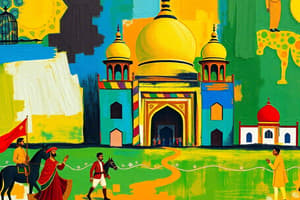Podcast
Questions and Answers
What policy did the British employ to maintain their control in India?
What policy did the British employ to maintain their control in India?
- Divide and Rule (correct)
- United We Stand
- Divide and Conquer
- Unity in Diversity
What sparked the Sepoy Mutiny of 1857?
What sparked the Sepoy Mutiny of 1857?
- Increase in taxes
- Forced conversion to Christianity
- Introduction of greased cartridges (correct)
- Introduction of new uniforms
What was the main tactic employed by Mahatma Gandhi in the Non-Cooperation Movement of 1920?
What was the main tactic employed by Mahatma Gandhi in the Non-Cooperation Movement of 1920?
- Armed rebellion
- Violent resistance
- Non-violent resistance (correct)
- Economic boycott
What was the main goal of the Indian National Congress, founded in 1885?
What was the main goal of the Indian National Congress, founded in 1885?
What was the outcome of India's struggle for independence in 1947?
What was the outcome of India's struggle for independence in 1947?
What was the primary motive behind the British East India Company's expansion in the Indian subcontinent?
What was the primary motive behind the British East India Company's expansion in the Indian subcontinent?
What is a legacy of colonization in India?
What is a legacy of colonization in India?
What was the outcome of the Battle of Plassey in 1757?
What was the outcome of the Battle of Plassey in 1757?
What was the impact of British colonization on India's economy?
What was the impact of British colonization on India's economy?
What was established in 1858 as a result of British colonization in India?
What was established in 1858 as a result of British colonization in India?
What was one of the social impacts of British colonization on Indian society?
What was one of the social impacts of British colonization on Indian society?
What was the outcome of the Battle of Buxar in 1764?
What was the outcome of the Battle of Buxar in 1764?
Flashcards are hidden until you start studying
Study Notes
Background
- India was colonized by the British East India Company (BEIC) in the mid-18th century.
- The BEIC was initially established to trade with the Indian subcontinent, but it gradually expanded its control over the region.
Causes of Colonization
- The British wanted to expand their empire and establish a foothold in the lucrative Indian market.
- The Indian subcontinent was rich in natural resources, such as cotton, spices, and textiles.
- The British also sought to spread Christianity and "civilize" the Indian population.
The Process of Colonization
- Battle of Plassey (1757): The BEIC defeated the Nawab of Bengal, marking the beginning of British colonization in India.
- Battle of Buxar (1764): The BEIC defeated the combined forces of the Mughal Empire and the Nawab of Bengal, solidifying British control over the region.
- Establishment of British Raj (1858): The British government abolished the BEIC and established direct rule over India, with the British monarch as the head of state.
Impact of Colonization
- Economic Exploitation: The British exploited India's natural resources, drained its wealth, and imposed heavy taxes on the population.
- Social and Cultural Changes: The British introduced Western education, law, and social systems, which had a profound impact on Indian society and culture.
- Divide and Rule: The British employed a policy of divide and rule, exploiting the existing social and religious divisions in Indian society to maintain their control.
Indian Response to Colonization
- Sepoy Mutiny (1857): A widespread rebellion against British rule, sparked by the introduction of greased cartridges that offended both Hindu and Muslim soldiers.
- Indian National Congress (1885): A national movement founded to promote Indian independence and self-rule.
- Non-Cooperation Movement (1920): A mass movement led by Mahatma Gandhi, advocating for non-violent resistance to British rule.
Legacy of Colonization
- Independence and Partition (1947): India gained independence from British rule, but was divided into India and Pakistan, resulting in one of the largest mass migrations in history.
- Ongoing Socio-Economic Challenges: The legacy of colonization continues to influence India's socio-economic development, with ongoing issues such as poverty, inequality, and social injustice.
Studying That Suits You
Use AI to generate personalized quizzes and flashcards to suit your learning preferences.




